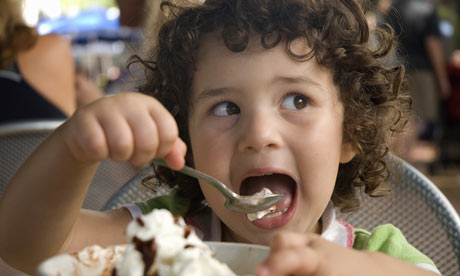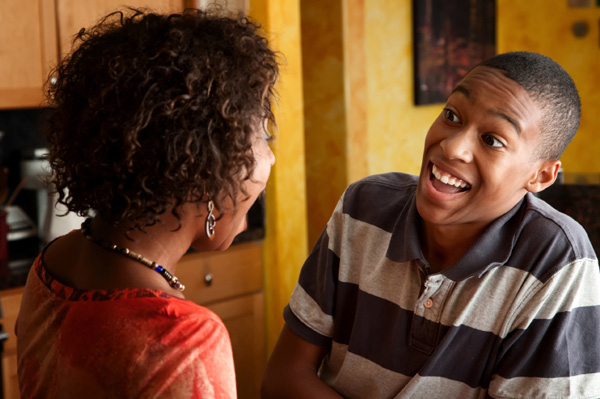A Parent’s Guide to Saying “No”
If you listen carefully, somewhere on earth, a parent is saying no.
The way the child responds depends on his back-story.
At the grocery store recently, I noticed a young mom shopping with her four kids. They swarmed around her, like honey bees around the queen. I remembered back. Shopping with four kids is what I used to do, and believe me, it takes courage.
Our paths first crossed in the produce section. The oldest child – a handsome boy of about nine – asked his mother, “Can I pick out some berries?”
She nodded calmly, granting permission.
The boy stood tall, as though proud of this privilege. Then, step, step, step, he hurried to make his selection.
I ran into the family a while later, in Bulk Foods.
The same little boy had gone off on his own, and picked up a box of gummy worms. Returning to his mother, he once again stood tall, full of confidence.
I couldn’t help thinking of the Wise Men, bearing gifts for the Christ child. My eyes drifted to where she stood. How would she respond this time? “Put it back,” she said, her tone kind, yet decisive. No raised eyebrows. No hint of aggravation.
Without argument, the boy put the box back on the shelf.  I had expected a tad of rebellion. An “Oh, man!” Or at least a grimace. But from where I stood, he seemed fine with it.
I had expected a tad of rebellion. An “Oh, man!” Or at least a grimace. But from where I stood, he seemed fine with it.
What was this mother’s secret?
And why are so many parents reluctant to do what she did? When children are gently but firmly told no from a young age, they learn to accept boundaries. There are some things they can do, and some they cannot. Some places they can go, and some that are off limits. They are not victims, but children who must be guided and protected. So why be all milquetoast about it?
Don’t parents know that kids learn to be unhappy – dare I say it – from them?
In her book, The Child in the Family, the Italian educator, Maria Montessori writes, “The child is extremely sensitive to everything he feels from the adult and wants to obey in every respect. Indeed, we have no idea to what degree or how perfectly he is ready to obey us always, yet it is this which characterizes him.”
You might be thinking, “Ha! That doesn’t sound like my kids.”
Here’s what you need to remember: Every time you interact with your child – not just when you want them to do something – you are laying pipe for future interactions. And those interactions, the ones you have every day, influence your child’s future behavior. When parents resort to arguing and bargaining with kids, they’ve already lost: Not only have they given away their authority, the parents are reinforcing negative behavior patterns that can turn into habits. 
It’s worth thinking about if you don’t want to play “Let’s Make a Deal” for every little request – cajoling and bribing your kids into compliance. Say a child wants to play a video game for the tenth time. The mom feels like she should say no. But she needs some time to herself, maybe on the phone. So she makes a little deal: If you promise to be nice to your sister for the rest of the afternoon, I’ll let you play your video game.”
This is an example of narcissistic parenting. Making decisions based on the parent’s needs. Not the child’s. Besides, can’t a kid be nice to his sister without needing a reward?
What if the mom at the store had said, “You didn’t pick up your room this morning. So I’m not buying gummy worms.”
That’s a terrible way of saying no. It teaches kids that their world is unpredictable. It teaches distrust.
Of course, babies’ demands are quite different. That’s because infants’ wants and needs are one and the same. By responding to their needs immediately, and answering their coos and smiles with our own smiles and silly sounds, parents create an atmosphere of joy and safety. It’s within such a nurturing environment that babies learn to see the world as a safe and wonderful place. They learn they are worthy of positive interaction. And their brains develop in a healthy way.
(Read “The Science of Attachment: The Biological Roots of Love,” by Lauren Lindsey Porter [Mothering, 2003], for a primer on why babies and young children require an abundance of positive interactions for proper brain development.)
As children grow up, they experience more of life’s challenges, including peer pressure. Saying no when necessary gives them a safety net. A “bad guy” to blame when friends might be steering them in the wrong direction. “No, you can’t go to the mall after school. You need to do your chores. But you can go on Saturday.” Or, “No, you can’t skateboard downtown. The signs say, No Skateboarding. How about if I take you to the skate park instead?”
When children are raised in this way, not with parental abdication, but involvement, they are able to hear the word no a lot better. They go on to face the inevitable challenges and disappointments of growing up with greater resilience. Frustration doesn’t eat them alive.
Parents, however, need be smart about it. No is not a word to use arbitrarily, out of laziness or disinterest, or the desire to punish.
This is where assessing children’s real needs is important. Sometimes saying no keeps a child from taking on bigger challenges. Saying yes might make more work for the parent, but saying no might cause unnecessary resentment in the child. Even apathy. We need to look at the whole situation before shaking our heads. Is there a real reason for saying no? Or are we just not willing to go to any trouble?
The downside of saying no arbitrarily, or too frequently, is that kids stop coming to us for help. Children, especially teens, often need parents simply to listen. They may need our advice, but they don’t want us to march into the classroom and demand a retest. They certainly don’t want our help getting a date for the prom. I thought my teens were interesting people. Fun to be with. I wanted to hear what they had on their minds.
I thought my teens were interesting people. Fun to be with. I wanted to hear what they had on their minds.
Kids who are treated well can deal with hearing “no.” They develop a particular kind of self-confidence – the I-know-things-will-work-in-the-end-kind of confidence, which is the kind you want them to have. It’s the crème de la crème of confidence that empowers kids for life.
My take on kids who can’t hear the word no is that they’re trying very hard to matter. They feel happy when they get new stuff or go someplace, but that happiness is fleeting.
“The key to a healthy stress response capability – to healthy self-regulation and ultimately resilience – is the pattern of this stress. When stress response networks are activated in small moderate ‘doses,’ they become stronger over time. In contrast, large, irregular, or extreme doses can interfere with their development.” (Born for Love: Why Empathy is Essential – and Endangered, Szalavivitz and Perry, 2010)
Of all the things your children will want to do, there will be plenty of times when you should say no. When you need to say no. “No, you can’t stand on the coffee table,” soon turns into, “No, you can’t eat ice cream before dinner.” And that becomes, “No, you can’t go to South Padre Island for spring break without a chaperon.”
Like gemstones, all kids have the potential to shine. But if parents cave in to every whim, children will be less able to deal with stresses later on, less likely to strive, and less likely to reach their potential.
Back to the mom in the grocery store.
I checked out at the register, wondering, does she even know what a good mom she is? I swung my cart around.
Her youngest, a toddler, sat in the cart reaching for a granola bin. But every time he lifted the lid, his older brother slammed it down, causing the tot to bubble over in fits of laughter. It was a scene that should have been captured on video. “You’re doing a great job with your kids,” I said.
The mom smiled, her expression one of good-natured tolerance. “Thank you,” she said. “I needed to hear that.” FFG







Leave a Reply